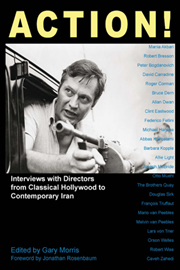Book contents
- Frontmatter
- Contents
- Foreword, by Jonathan Rosenbaum
- Editor's Preface
- Acknowledgements
- Introduction: The Art and Craft of Interviewing
- I Going Hollywood: Masters of Studio Style
- II Tickets to the Dark Side: Festival Favorites
- III Blows Against the Empire: Indie Godfathers
- IV Edgeplay: Avant-Garde Auteurs
- V Women in Revolt: Artist-Activists
- VI The Canon: Brilliance without Borders
- 16 “For a Kind of Pleasure”: Federico Fellini
- 17 Transcendental Style, Poetic Precision: Robert Bresson
- 18 “The Fruitful Tree Bends”: Abbas Kiarostami
- 19 Alter Ego, Autobiography and Auteurism: François Truffant
- Contributor Biographies
19 - Alter Ego, Autobiography and Auteurism: François Truffant
from VI - The Canon: Brilliance without Borders
Published online by Cambridge University Press: 05 March 2012
- Frontmatter
- Contents
- Foreword, by Jonathan Rosenbaum
- Editor's Preface
- Acknowledgements
- Introduction: The Art and Craft of Interviewing
- I Going Hollywood: Masters of Studio Style
- II Tickets to the Dark Side: Festival Favorites
- III Blows Against the Empire: Indie Godfathers
- IV Edgeplay: Avant-Garde Auteurs
- V Women in Revolt: Artist-Activists
- VI The Canon: Brilliance without Borders
- 16 “For a Kind of Pleasure”: Federico Fellini
- 17 Transcendental Style, Poetic Precision: Robert Bresson
- 18 “The Fruitful Tree Bends”: Abbas Kiarostami
- 19 Alter Ego, Autobiography and Auteurism: François Truffant
- Contributor Biographies
Summary
This interview was conducted both in English and French (translated by me) in late May of 1984 in François Truffaut's (1932–1984) private office at Les Films du Carrosse, the production company in Paris he founded and ran. His last public appearance had been in a television interview on 13 April 1984, for the Apostrophes series hosted by Bernard Pivot. When Truffaut generously agreed to meet with me for what was intended to be a print interview (which did not materialize at the time), he was clearly weak, but unquestionably lucid. He died from brain cancer on 21 October 1984.
Interview
I'd like to focus our discussion today on the Antoine Doinel cycle, M. Truffaut–though perhaps we'll have time to treat some other films of yours as well. Could we begin by talking about your life prior to becoming a movie director?
Yes, of course. During the war, I saw many films that made me fall in love with the cinema. I'd skip school regularly to see movies–even in the morning, in the small Parisian theaters that opened early. At first, I wasn't sure whether I'd be a critic or a filmmaker, but I knew it would be something like that. I had thought of writing, actually, and that later on I'd be a novelist. Next I decided I'd be a film critic.
- Type
- Chapter
- Information
- Action! , pp. 323 - 346Publisher: Anthem PressPrint publication year: 2009
- 1
- Cited by

